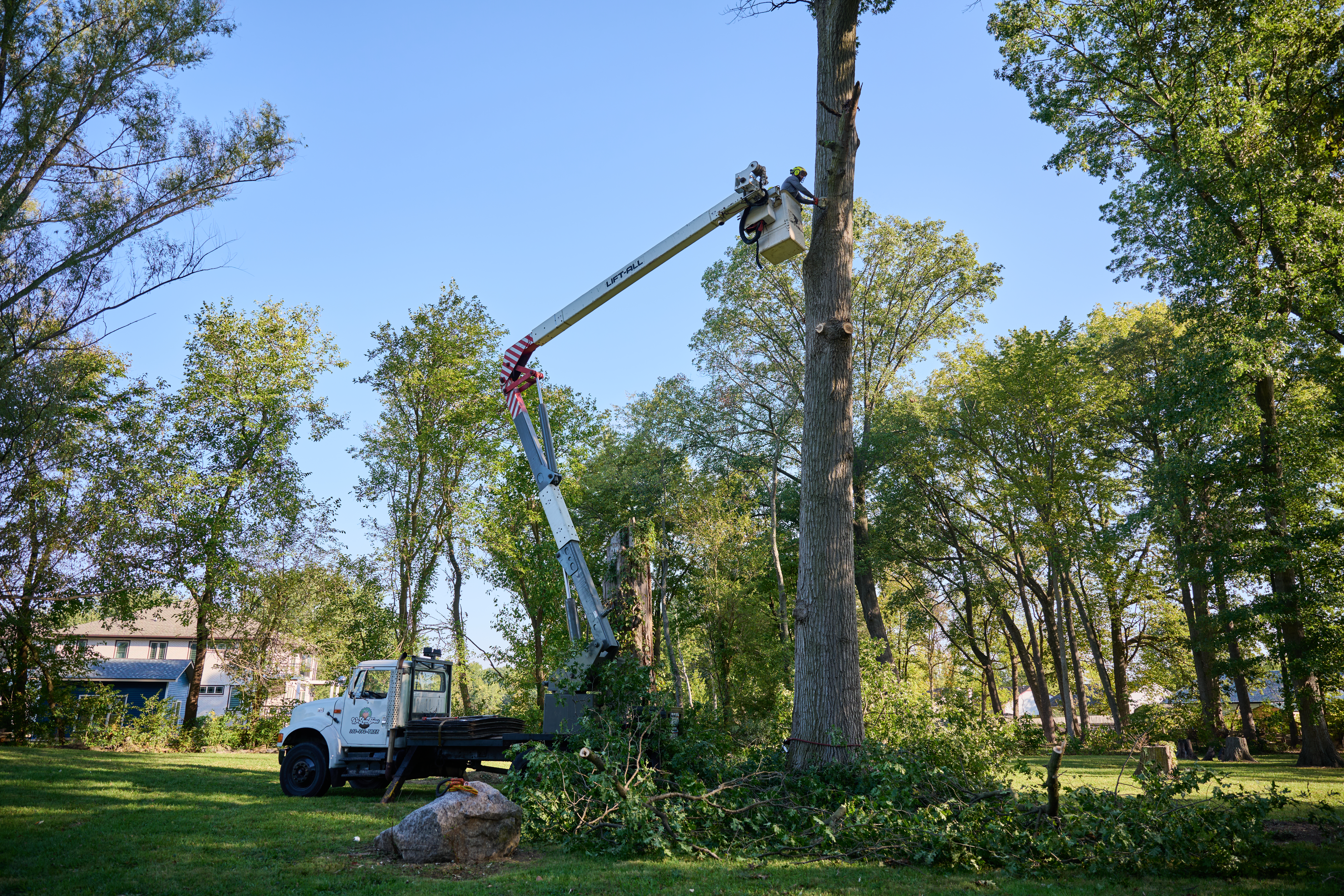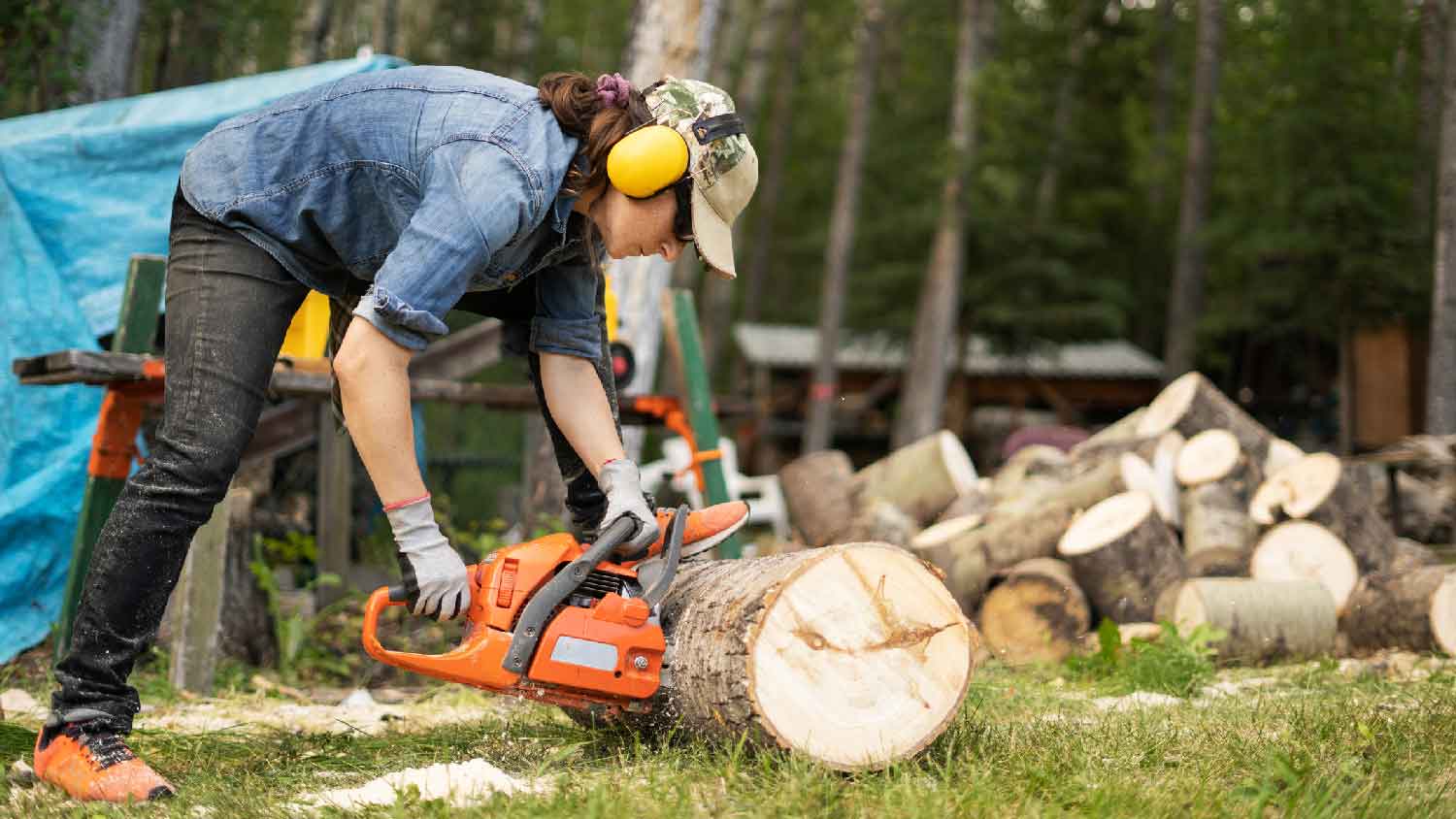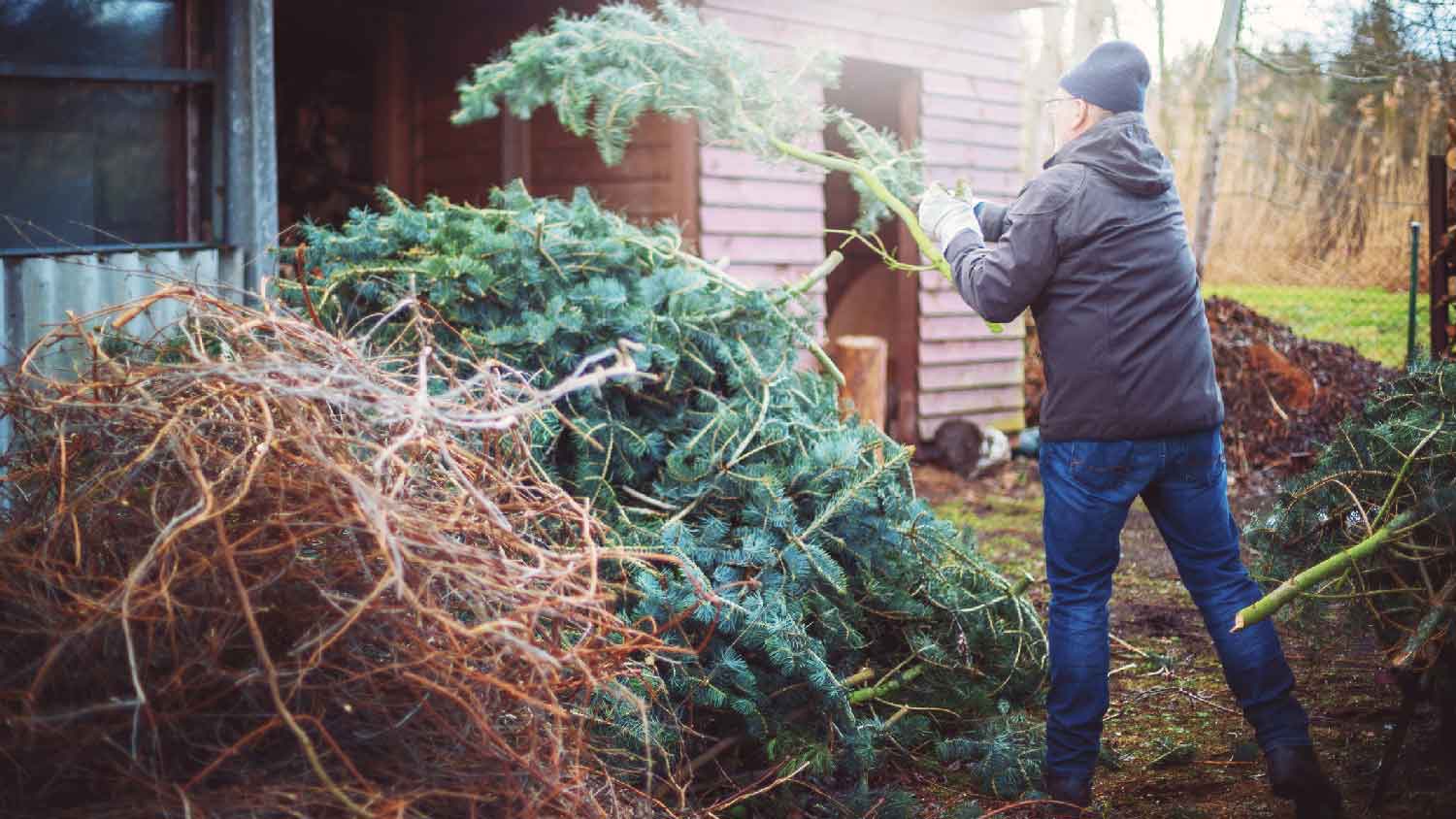
Discover the average tree maintenance cost, key price factors, and tips to save. Get expert insights to plan your tree care budget with confidence.
You can pay up to $625 or more depending on the amount of tree debris you need removed.


Tree debris removal isn’t a standard service with tree removal, but it’s a common add-on.
Most companies charge based on how many trips they have to take to the dump, so smaller trees will be more affordable.
Some companies may give you the mulch for free after wood chipping, while others charge a fee.
Book during winter for the lowest rates, and avoid busy times (like right after a storm).
If you plan to DIY this project, chop the wood when it’s fresh and green for the best results.
Tree debris removal cost can range from $50 to $500, with an average job costing around $150. The total cost is impacted by many factors, with the size of the tree playing the largest role in pricing. Labor can range from $50 to $100 per hour based on the type of service. Let’s dig into how to budget for tree debris removal services.
Many circumstances affect the price of tree debris removal, including the number of trips, who performs the service, what happens to the wood, the location of the debris, your home’s location, and when you need the job done. Understanding what this task involves can help you estimate how much it will cost to clean up the debris.
The cost of hauling your yard’s tree debris to the dump is typically priced by the number of trips it takes your tree debris team to clear the entire area. Tree debris removal costs between $75 to $250 per dump trip, depending on the load size, distance to the dump, and vehicle size. When hiring a tree debris removal service, ask them to estimate the number of trips they’ll take based on the amount of debris and their vehicle size.
| Number of Trips to Dump | Average Cost |
|---|---|
| 1 | $75–$250 |
| 2 | $150–$500 |
| 3 | $225–$750 |
| 4 | $300–$1,000 |
Many types of local contractors handle tree debris removal. Before hiring a professional tree debris removal team, verify that they are licensed and insured. Tree debris removal often involves dangerous equipment like chainsaws or wood chippers, and you do not want to assume responsibility for these devices. The best pros to hire for this job are tree debris services, but you can also consider hiring a landscaping or waste removal company.
| Tree Debris Service | Landscapers | Waste Removal Services |
|---|---|---|
| By the hour | By the hour | By load size and other factors |
| $25 to $50 per hour | $50 to $100 per hour | A minimum of $75 to $125 for 1/8 truck load (the size of a medium-sized tree) |
| Woodchipper or logs | Woodchips, logs, or landfill | Landfill |
| Affordable rates, you can keep wood mulch or logs, and they can trim damaged trees | You can keep wood mulch or logs, and they may trim damaged trees | May be the least expensive option for larger projects or if wood debris needs to be collected from your yard |

There are several ways to dispose of tree debris, including chipping it into mulch, chopping it into firewood, or bringing it to your waste management facility.
| Wood Chipping | Log Splitting | Dump Disposal |
|---|---|---|
| $50–$125 per hour | $50–$120 per hour | $75–$250 per trip |
Contractors that use woodchippers may include this service as part of their base cost or charge an additional fee to mulch the debris. Many contractors will provide you with the resulting mulch for free if you request it, but some charge for it.
If you want the branches cut into firewood, expect to pay an extra per-hour fee for log splitting. Allow the wood to dry out for six months to a year before burning it to reduce dangerous smoke buildup.
When the debris is taken to your local green waste disposal, the contractor will pay a fee per load they bring to the dump. If your contractor intends to take the wood to your waste management facility, be sure to ask if these fees are included in their initial quote.
The tree debris’ location and condition factors into your service total. If the contractor arrives to find a neatly stacked pile of debris at the front of your yard, they will spend less time on task, which saves money if you’re paying per hour. On the other hand, if workers have to walk to a far corner of your property, cut up a fallen tree, and drag the wood back to their vehicle, this inconvenience can increase your budget significantly. If the tree has fallen in a dangerous area, such as your home's roof, expect to pay more based on the risk to the contractor.
When trees or branches fall on a power line, contact the power company to have them remove the debris from the line. A contractor can dispose of the wood once it’s safely on the ground.
If you live in a big city or the suburbs, there’s most likely a tree removal contractor in your immediate area. However, if you live in a rural area, you may need to pay extra to account for the additional time and gas it takes to get to your property.

Landscapers and tree trimmers are the busiest during the summer, so expect to pay a premium for their service during that time of year. On the other hand, winter is typically the cheapest time of year for tree removal and landscaping services. If you live in an area where work slows dramatically when the weather is cool, you could save as much as 20% by having debris removed during the winter.
The one exception is after a major storm when everyone in the area will rush to remove fallen trees and branches quickly. If you can wait a week or more after the storm rather than rushing the job, you can expect your bill to be a little lower. On the other hand, emergency services performed outside of regular business hours can cost an extra $100 to $150 per hour.
Tipping isn’t mandatory for service providers that remove tree debris, but it is courteous, especially if the job was very physically demanding. Since tips aren’t required, there is no set standard, but those who choose to offer a gratuity typically offer $10 to $50 to each worker on the job.
In some cases, tree debris removal services charge by the specific type of job they carry out on your property. This payment structure is particularly helpful to keep in mind when hiring a tree debris removal team to perform other yard maintenance tasks, such as stump removal. Check out the average prices for tree debris removal services:
| Tree Debris Removal Service | Average Cost |
|---|---|
| Brush pile removal | $150–$200 per trip |
| Tree branch removal | $75–$250 |
| Tree removal | $200–$2,000 |
| Tree stump removal | $170–$550 |
| Junk removal | $60–$600 |
| Yard cleanup | $125–$400 |
| Shrub and brush removal | $25–$150 per plant |
Removing tree debris from your property can be a gargantuan task that looks deceptively simple until you're lugging large branches to a rented truck or trailer. Other than freshly cut greens, most tree debris needs to be professionally collected and hauled away by local tree debris removal pros near you with the proper safety gear and equipment. While saving on labor can reduce this project's cost by 60% to 70%, the risk of injury and the time-consuming task of condensing and transporting brush and wood might not be worth it for most homeowners.
Following major cutting projects or tree felling, this is why it's best to leave removal to pros:
Trained landscapers specializing in tree debris removal utilize tools such as stump grinders and wood chippers to compact heavy, large debris.
The average cost just to rent a stump grinder to handle leftover wood on your own is $300.
Limbs, sticks, and other debris left to dry can be difficult to cut through or break down.
Removing debris can expose you to bacteria, rashes, and the risk of tick or spider bites.
Even if you plan to let a pro haul away your tree debris, you can lighten their load and reduce the cost by doing this:
Cut as much wood as you can while it's still fresh, green, and easy to work with.
Dispose of small debris for free if your town has a weekly or seasonal green waste collection.
Remove smaller debris that can be bagged or composted using pruning shears, and save the heavier branches or chunks for professional disposal.

There are many ways to save money when removing tree debris from your property. The biggest thing you can do is handle the prep work in advance by collecting the tree debris and stacking it up neatly near the front of your property. Ideally, put the thick ends of the branches facing the driveway or street so they can be mulched or loaded more quickly. Keep your stacks small and tidy, with no more than three large branches each.
Similarly, if you have the luxury of waiting to remove the debris, keep the concept of supply and demand in mind. Wait until landscapers and tree service companies are less busy during the winter to book your services. If the debris fell during a storm, wait a week or more before obtaining quotes. A good rule of thumb is that the larger the storm, the longer you should wait for prices to go back down.
When reaching out to a tree debris removal professional, ask whether you will be charged by load or per service to optimize the amount of debris you can have removed at once without incurring additional costs.
Be prepared to share details about the species of trees or shrubbery that require removal.
If your budget allows, consider asking about pruning services that can help prevent overgrowth and make lawn maintenance more manageable in future seasons.
Always confirm that a professional is bonded and insured before allowing them to handle heavy tree limbs or debris on your property.
Home is the most important place on earth, which is why Angi has helped more than 150 million homeowners transform their houses into homes they adore. To help homeowners with their next project, Angi provides readers with the most accurate cost data and upholds strict editorial standards. We extensively research project costs to develop the pricing data you see, so you can make the best decisions for you and your home. We rely on reputable sources, including the U.S. Bureau of Labor Statistics, academic journals, market studies, and interviews with industry experts—all to ensure our prices reflect real-world projects.
Want to help us improve our cost data? Send us a recent project quote to [email protected]. Quotes and personal information will not be shared publicly.
From average costs to expert advice, get all the answers you need to get your job done.

Discover the average tree maintenance cost, key price factors, and tips to save. Get expert insights to plan your tree care budget with confidence.

How much does it cost to rent a chainsaw? Whether it’s for cleaning up your yard or cutting firewood, learn what options are available and what you’ll pay.

Trimming your bushes is one of the less costly aspects of landscaping, and it’s helpful to bundle many trimming services together to save money.

Tree stumps can take a long time to die and become suitable for removal. You can help out by applying Epsom salt and vinegar, a homemade option that works with patience.

Can you cut down a tree on your property? There are laws about trees and chopping them down, so read this guide before you start a tree clearing project.

What do elm trees look like? Learn how to identify elm tree leaves, bark, and the different types of this picturesque tree with this informational guide.